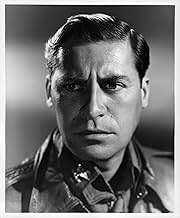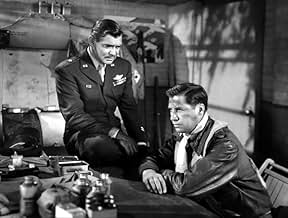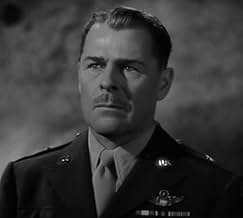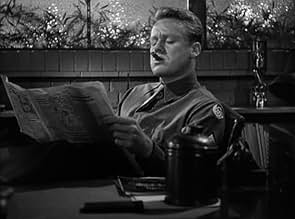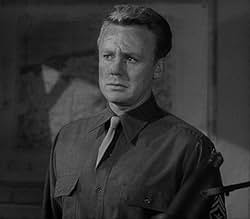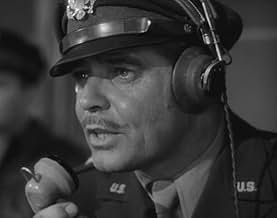VALUTAZIONE IMDb
7,3/10
2235
LA TUA VALUTAZIONE
Aggiungi una trama nella tua linguaArmy generals struggle with the decision to prioritize bombing the German factories producing new jet fighters over the extremely high casualties the mission will cost.Army generals struggle with the decision to prioritize bombing the German factories producing new jet fighters over the extremely high casualties the mission will cost.Army generals struggle with the decision to prioritize bombing the German factories producing new jet fighters over the extremely high casualties the mission will cost.
- Regia
- Sceneggiatura
- Star
- Premi
- 3 vittorie e 2 candidature totali
Recensioni in evidenza
I found an old tape of Command Decision which I must have made 20 years ago. I concur with all those who have said that it is one of the best WW2 films ever made, but what struck me most forcefully was the fact that this highly intelligent, gripping and thoughtful film was made with a large crew of established filmstars by a completely commercial film studio. It brought home to me forcibly what was lost when the old studio system broke up and the sheer craftsmanship which it embodied was dispersed. The sheer childishness of most current films becomes even more evident.
Writing as one who lived through the bombing of Britain, the historical perspective on the Allied wartime bombing campaign was fascinating. One small complaint--all film coverage of the American campaign in WW2 seems to focus on the Flying Fortress. Actually, most of the bombs were dropped by the Consolidated Liberator squadrons--less photogenic but more effective!
Writing as one who lived through the bombing of Britain, the historical perspective on the Allied wartime bombing campaign was fascinating. One small complaint--all film coverage of the American campaign in WW2 seems to focus on the Flying Fortress. Actually, most of the bombs were dropped by the Consolidated Liberator squadrons--less photogenic but more effective!
Just saw this on TCM. The story of generals fighting generals, press officers, politicians, etc. There's a few cliches, like the pilot who get news his wife has had a son gets killed during a mission. Don't expect Gable to give an over-the-top performance. It was originally a stage play -- so there are lots of one-on-one confrontations -- they are all done well.
There are no special effects, no women, no air battles. There's spliced in newsreel footage of a plane that lands and explodes. 1948 audiences couldn't really appreciate the abstraction of "air supremacy" that is the heart of the fight here. In our post-Gulf War post-Afghan War -- we now can appreciate the vision of men who took these risks -- so I'd say there's a special historical importance to this film. Check around the web for info on Gable's WW II service record -- he enlisted at age 41 into the Army Air Corps.
There are no special effects, no women, no air battles. There's spliced in newsreel footage of a plane that lands and explodes. 1948 audiences couldn't really appreciate the abstraction of "air supremacy" that is the heart of the fight here. In our post-Gulf War post-Afghan War -- we now can appreciate the vision of men who took these risks -- so I'd say there's a special historical importance to this film. Check around the web for info on Gable's WW II service record -- he enlisted at age 41 into the Army Air Corps.
"Command Decision" is a wonderful film filled with several great performances. It's Gable's movie, but he's very capably supported by Walter Pigeon, Brian Donlevy and John Hodiak, who nearly equals his "Lifeboat" performance.
Pigeon is especially good in the roll of a senior commander who is more concerned with the political considerations of the war effort than the tactical and strategic goals. (Not without reason - The film correctly details the perilous and tenuous position that the 8th Air Force found itself in during the worst combat period of 1943.)
One of the best scenes in the film is a very long speech given by Pigeon, wherein he explains his reasons for fighting the good fight to keep American air power strong. The scene is a good 6 or 7 minutes long, one camera shot, entirely done without cuts. It must have been rehearsed extensively as it requires about 10 actors to interact with Pigeon at several times, all the while he is moving about the room. Seamless, and very well done! This remarkable scene is followed up with one almost as long, given by Gable.
The drama is occasionally broken up with comic moments provided by Van Johnson, as a savvy sergeant, and Clinton Sunberg as a fastidious aide to Pigeon's General Kane.
If you like to watch actors banging away with words instead of guns, this is the war movie for you.
Pigeon is especially good in the roll of a senior commander who is more concerned with the political considerations of the war effort than the tactical and strategic goals. (Not without reason - The film correctly details the perilous and tenuous position that the 8th Air Force found itself in during the worst combat period of 1943.)
One of the best scenes in the film is a very long speech given by Pigeon, wherein he explains his reasons for fighting the good fight to keep American air power strong. The scene is a good 6 or 7 minutes long, one camera shot, entirely done without cuts. It must have been rehearsed extensively as it requires about 10 actors to interact with Pigeon at several times, all the while he is moving about the room. Seamless, and very well done! This remarkable scene is followed up with one almost as long, given by Gable.
The drama is occasionally broken up with comic moments provided by Van Johnson, as a savvy sergeant, and Clinton Sunberg as a fastidious aide to Pigeon's General Kane.
If you like to watch actors banging away with words instead of guns, this is the war movie for you.
There must be at least one whole generation of viewers who don't even know this film exists! Yet it remains one of the very best WWII films ever made. I first saw as a child, when it was quite new, and have seen it several times since. It has never lost its hold and that, I suppose, principally because of Clark Gable's superb performance (although the other parts are all very strongly done). It really must be one of his finest screen roles and that alone, one might think, would ensure that it is never long absent from television screens. Sadly it has been shown in Britain but once that I know of, and is not available here on a PAL-system video, although "Twelve O'Clock High" is available and often screened. In many ways the two films complement each other, each not wholly to be appreciated without seeing the other. "Twelve O'Clock High" has an almost exclusively military focus while "Command Decision" brings in the effect of political factors on military decisions. The latter film, however, has an edge: Gable on top form and that was always something very special.
Command Decision was adapted from a Broadway play that ran for 409 performances the previous year. Tony Awards were won by Paul Kelly who played General K.C. Dennis and James Whitmore for Tech Sergeant Emanuel Evans. The play shows the process of making military decisions when you have to factor in the politicians who control the purse strings. It's a necessary evil in a society that values civilian control of the military.
Both during and after World War II there was a debate among the British and American air commanders over the value of daylight versus nighttime bombing attacks. The British did night raids over Germany, responding in kind to what the Luftwaffe had done to them. Fly over at high altitudes and just drop the bombs. It did make for fewer casualties among the RAF pilots of their Lancaster bombers.
The Americans opted for daylight raids at a lower altitude trying to hit certain strategic objectives. In Command Decision it involves three factories that intelligence has learned are manufacturing new jet aircraft. If the Nazis had ever developed the far advanced jets against the Allied propeller aircraft in any number, the course of the war over Europe might have changed. Just like the V-2 rockets were developed too late to help the Axis cause.
Command Decision has Clark Gable leading a distinguished cast as the general who has to make the decision about whether to bomb or not, to go into Germany's heartland without fighter escort. Unfortunately his purely military outlook is not shared by his immediate superior Walter Pidgeon who has to factor in the politicians in Congress who read the dispatches by correspondents like Charles Bickford here about the appalling losses in American life.
In many ways Pidgeon has the most difficult part in the film. He has to take in the voices of objection raised by the visiting Congressional delegation led by Edward Arnold. Pidgeon is a politician, but purely by necessity. We admire Gable's stand on principle, but the audience also respects Pidgeon and sympathizes with him.
On Broadway Command Decision takes place in the headquarters and to make it better for the screen, playwright William Wister Haines wrote an additional scene that Paul Kelly did not do on Broadway. Clark Gable on a radio microphone tries to talk down a bombardier who is piloting a plane where the pilot and co-pilot are wounded and killed. It's a harrowing scene and one of the best Clark Gable ever did. Gable must have drawn from his World War II experience, he was a tailgunner in our Army Air Corps and flew many a B-17 mission over Germany.
Rounding out a distinguished group of MGM contractees are Van Johnson, Brian Donlevy, Marshall Thompson, Cameron Mitchell, Warner Anderson, Ray Collins, John McIntire and John Hodiak. They all cast well as Army Air Force personnel. Johnson plays the part that James Whitmore originated on stage and provides what little humor there is in this film.
The main criticism of Command Decision has always been that it is too stagey. But I found it an absorbing account of the decision making process in a military command.
Both during and after World War II there was a debate among the British and American air commanders over the value of daylight versus nighttime bombing attacks. The British did night raids over Germany, responding in kind to what the Luftwaffe had done to them. Fly over at high altitudes and just drop the bombs. It did make for fewer casualties among the RAF pilots of their Lancaster bombers.
The Americans opted for daylight raids at a lower altitude trying to hit certain strategic objectives. In Command Decision it involves three factories that intelligence has learned are manufacturing new jet aircraft. If the Nazis had ever developed the far advanced jets against the Allied propeller aircraft in any number, the course of the war over Europe might have changed. Just like the V-2 rockets were developed too late to help the Axis cause.
Command Decision has Clark Gable leading a distinguished cast as the general who has to make the decision about whether to bomb or not, to go into Germany's heartland without fighter escort. Unfortunately his purely military outlook is not shared by his immediate superior Walter Pidgeon who has to factor in the politicians in Congress who read the dispatches by correspondents like Charles Bickford here about the appalling losses in American life.
In many ways Pidgeon has the most difficult part in the film. He has to take in the voices of objection raised by the visiting Congressional delegation led by Edward Arnold. Pidgeon is a politician, but purely by necessity. We admire Gable's stand on principle, but the audience also respects Pidgeon and sympathizes with him.
On Broadway Command Decision takes place in the headquarters and to make it better for the screen, playwright William Wister Haines wrote an additional scene that Paul Kelly did not do on Broadway. Clark Gable on a radio microphone tries to talk down a bombardier who is piloting a plane where the pilot and co-pilot are wounded and killed. It's a harrowing scene and one of the best Clark Gable ever did. Gable must have drawn from his World War II experience, he was a tailgunner in our Army Air Corps and flew many a B-17 mission over Germany.
Rounding out a distinguished group of MGM contractees are Van Johnson, Brian Donlevy, Marshall Thompson, Cameron Mitchell, Warner Anderson, Ray Collins, John McIntire and John Hodiak. They all cast well as Army Air Force personnel. Johnson plays the part that James Whitmore originated on stage and provides what little humor there is in this film.
The main criticism of Command Decision has always been that it is too stagey. But I found it an absorbing account of the decision making process in a military command.
Lo sapevi?
- QuizClark Gable enlisted in the US Army Air Forces after his wife Carole Lombard died in a plane crash on a war bonds selling trip assisting the war effort. Gable went to Officers Candidate School (OCS), graduating as a second lieutenant, and was eventually promoted to major. He was trained as an aerial gunner and combat cameraman and was awarded both the Distinguished Flying Cross and Air Medal for at least five aerial bombing missions over Germany from England with the 351st Bomb Group (Heavy). Adolf Hitler personally offered a reward to the pilot or anti-aircraft gun crew who shot down Gable's plane.
- BlooperWhen General Dennis tries to talk down the bombardier flying the crippled bomber, the bombardier reports that the aircraft's fuel is exhausted. Presumably he had also dropped his bomb load over the target. His on-board supply of machine gun ammunition should be very low if not exhausted. Yet when the bomber crashes, it explodes and burns. If he has no bombs, no gas , and no machine gun ammunition, what's to burn?
- Citazioni
James Carwood: What's the answer, Brockie, all guts and no brain?
Elmer Brockhurst: No. That's putting it too simply. Dennis is one of those boys whose brain is fascinated by guts. He loves this lousy war.
- Versioni alternativeAlso available in a computer colorized version.
- ConnessioniFeatured in Clark Gable: Tall, Dark and Handsome (1996)
I più visti
Accedi per valutare e creare un elenco di titoli salvati per ottenere consigli personalizzati
- How long is Command Decision?Powered by Alexa
Dettagli
Botteghino
- Budget
- 2.467.000 USD (previsto)
- Tempo di esecuzione
- 1h 52min(112 min)
- Colore
- Proporzioni
- 1.37 : 1
Contribuisci a questa pagina
Suggerisci una modifica o aggiungi i contenuti mancanti


